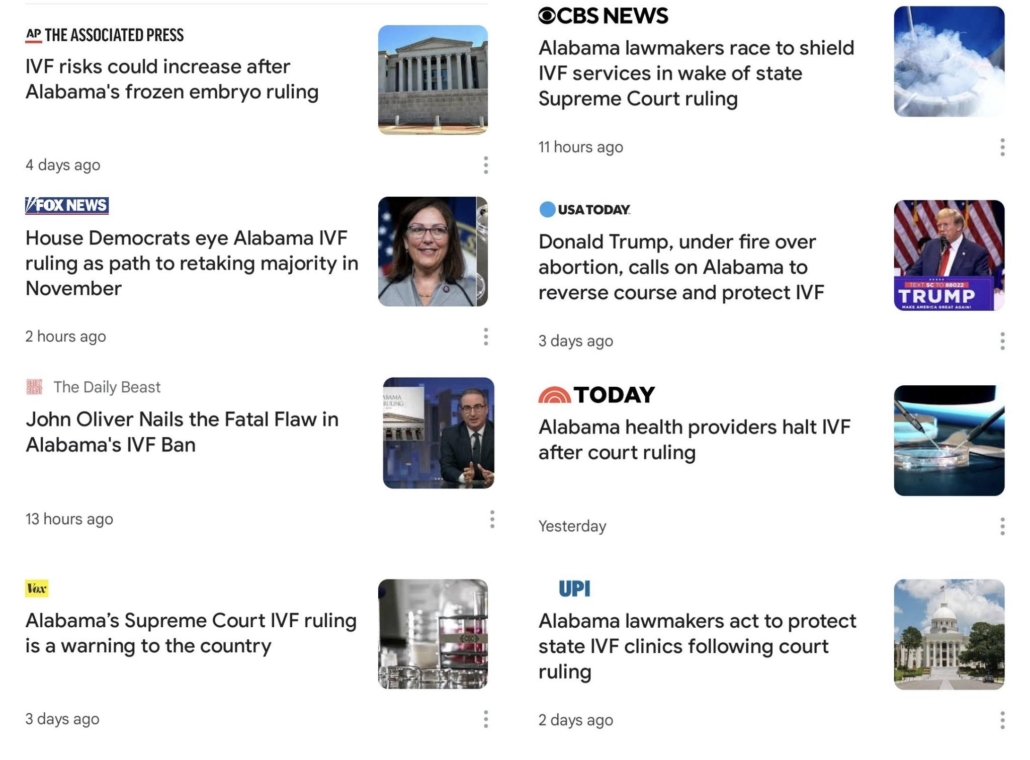Wild Media Bias in Alabama IVF Case
The Alabama Supreme Court ruled in favor of infertile couples who conceived through IVF. That bears repeating: the IVF parents won. Here’s the full text of the Court’s opinion so you can confirm for yourself.
If you are a casual observer just going off of headlines, you could be forgiven for believing the exact opposite:

Media bias is nothing new, but this is pretty egregious. There is no IVF ban! How on earth did we get here?
First, a quick recap of the case. The plaintiffs were James and Emily LePage (parents of Embryo A and Embryo B), William and Caroline Fonde (parents of Embryo C and Embryo D), and Felicia Burdick-Aysenne and Scott Aysenne (parents of Baby Aysenne). The LePages, Fondes, and Aysennes all sought in vitro fertilization (IVF) from the Center for Reproductive Medicine. The procedures were a success, conceiving Embryo A, Embryo B, Embryo C, Embryo D, and Baby Aysenne. The Center for Reproductive Medicine kept a storage facility, described as a “cryogenic nursery,” to preserve the embryos while they awaited implantation. But the Center for Reproductive Medicine failed to maintain basic security measures. Tragically, a random person entered the cryogenic nursery and killed the embryos.
The LePages, Fondes, and Aysennes sued the Center for Reproductive Medicine for wrongful death. The Center for Reproductive Medicine tried to get the case dismissed, arguing that the state’s Wrongful Death of a Minor Act did not apply. The Alabama Supreme Court ruled in favor of the parents, allowing their lawsuit to proceed. The Court reasoned that the Wrongful Death of a Minor Act had already been applied to unborn children in previous cases, and the fact that these embryos were conceived via IVF did not provide a basis to exclude them.
Interestingly, the Center for Reproductive Medicine acknowledged that the embryos were living human beings. The science was not up for debate in this case. They just didn’t want to be held to the high legal standards of someone handling human lives. After the decision’s release, other fertility clinics quickly jumped on the fear-of-accountability bandwagon, threatening to shut themselves down. Which is… really telling on themselves, when you think about it.
That still leaves the question of why so many media outlets uncritically adopted the fertility industry’s spin. After all, it’s normally uncontroversial that businesses are exposed to lawsuits when they cause harm.
I could jump to the conclusion that it’s pro-abortion journalistic bias. Experience would support that conclusion. But I try to be fair, so I racked my brain for an unrelated scenario that resulted in similar coverage. I sort of found one: the 2022 trial of RaDonda Vaught, in which a nurse who accidentally administered the wrong medication and killed her patient was sentenced to probation. Medical groups reacted with alarm, arguing that mistakes are inevitable and that criminal liability would scare students away from nursing careers. The media did give significant coverage to that perspective.
But I don’t recall any of them falsely claiming a “nursing ban” or trying to make it an election issue. They’ve really outdone themselves this time.
If you’re that casual observer who isn’t fully immersed in the right-to-life debate, that’s okay. We can’t all be fully informed about every issue. All I ask is that when the next flood of headlines comes, ask yourself: am I getting the true story here?
Hear more from Monica’s TikTok summarizing the same case:



